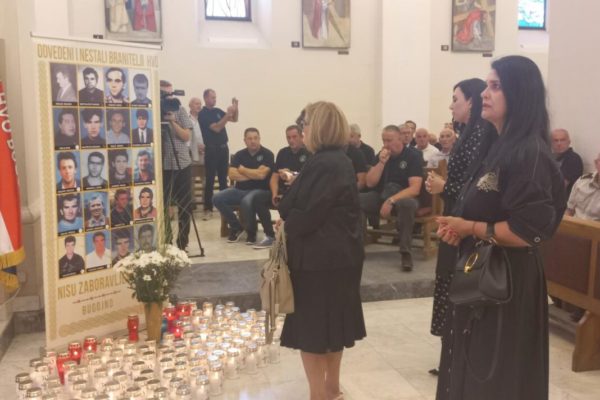 The “suicide” of Merzuk Aletić, a former police officer from Donji Vakuf, during the war a member of the infamous El Mujahideen unit, which was organized by Alija Izetbegović in Rostovo, clearly indicating that the mujahideen are an integral part of the Bosniak military structures, seems to have marked a turning point in the more than 30 years of struggle by Bugojno Croats for justice and truth.
The “suicide” of Merzuk Aletić, a former police officer from Donji Vakuf, during the war a member of the infamous El Mujahideen unit, which was organized by Alija Izetbegović in Rostovo, clearly indicating that the mujahideen are an integral part of the Bosniak military structures, seems to have marked a turning point in the more than 30 years of struggle by Bugojno Croats for justice and truth.
After Aletić raised his hand against himself in front of investigators from the State Investigation and Protection Agency (SIPA), at the moment when he was supposed to reveal the locations with the bodies of 11 forcibly taken Croatian detainees, the nervousness among those responsible for the crimes and persecution of Croats from Bugojno was at its peak, writes Večernji list BiH.
The indictment of the leaders of the Bosniak political and military leadership, Dževad Mlaćo, Selma Cikotić, and Tahir Granić, about 15 days after the suicide of a repentant witness, showed that there were indeed reasons for concern among all those who had blood on their hands.
This was confirmed by the pressure on the families of the missing to give up the search for justice and truth. Alija Osmić, a member of the Military Police of the 307th Brigade of the Army of RBiH, the unit against whose commander Granić an indictment was also raised, a few days after Aletić’s suicide, asked Dijana Strujić, the wife of Mihovil Strujić, one of the missing whose mortal remains are still being sought, to stop searching for justice and truth. Dijana Strujić is also the president of the Association of Families of Killed and Missing Croatian Defenders of Bugojno.
“On December 4, I received a call from an unknown number. I answered, and the man who called introduced himself as Alija Osmić. I told him I didn’t know him personally, I know he was convicted of war crimes, but I don’t know what that man looks like. He said that he knows me very well and clearly told me that we should stop alleged pressure because “innocent” people are killing themselves because of us,” Dijana Strujić recounted to Vecernji.ba part of the conversation that lasted about 15 minutes.
“After accusing us, the families of the missing, of being responsible for the suicide of a witness, he repeated several times that he supposedly innocently lay in prison for war crimes. I told him that his three years are nothing compared to more than 30 years for us families who are looking for the bodies of our missing. He told me that if I want the truth, I should ask Enes Sijamija and that the former prosecutor Slavica Terzić is to blame for everything. I said that I am not the address for such insinuations and that everything he knows should be reported to the competent institutions,” Strujić told us. After the conversation she had with Alija Osmić and the pressure on her and other families of the missing to stop searching for justice and truth for the crimes, Dijana Strujić says, fear entered, and she is increasingly difficult to cope with it.
“I don’t go to morning prayers or leave the house in the evening. I live in fear of a man convicted of war crimes who had the audacity to call me and ask me and the families of the missing to give up because some people are apparently killing themselves because of us, and they are good people and believers for Osmić while he claims to be unjustly convicted. Imagine a situation where any Croat convicted of war crimes against Bosniaks calls one of the families of the killed and missing. I think the whole country would be on its feet instantly. Apparently, I can be disturbed,” concludes Dijana Strujić, the wife of the missing Mihovil Strujić and the president of the Association of Families of Killed and Missing Croats of Bugojno.
Alija Osmić’s call, Dijana Strujić considers harassment with elements of threat. If such a call is repeated, she will seek police protection.
Alija Osmić’s call is one in a series of pieces of evidence that in Bugojno, perpetrators of crimes against Croats have the status of heroes, while the families of victims are exposed and live in fear. The lack of trials against those responsible for the crimes is not the only reason that has created such an atmosphere. Many trials, including the trial of Alija Osmić for the families of the victims, are just a simple farce. Osmić was tried under a much milder law of the former SFRY, and in the second-instance procedure, his sentence was reduced from 11 to three years, citing numerous mitigating circumstances. Although it sounds unbelievable, one of them was found by members of the appellate panel of the Court of BiH in the fact that before the torture of Croatian prisoners in which Osmić excelled in three camps, BH Bank, the Marxist Center, and the garage in the village of Donjići, crimes were committed against Bosniaks, which, they said, caused resentment. Crime, in this case, justifies crime, which is a dangerous precedent in judicial practice that has left room for swapping the roles of the perpetrator and the victim, protecting the perpetrator and exposing the victim to pressure and fear. /HMS/